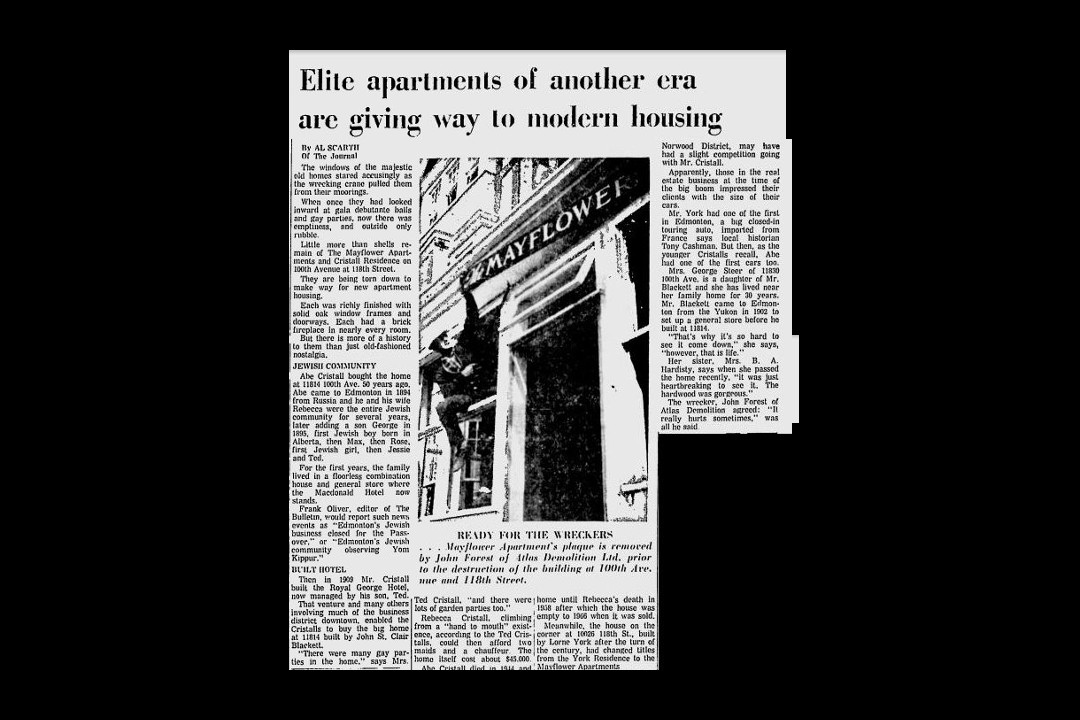On this day in 1969, demolition was underway on the building once home to Edmonton's first Jewish family.
The demolition saw the end of both the original Mayflower apartment building and the old Cristall Residence, the former home of Abe and Rebecca Cristall. The couple became the first Jewish residents of Edmonton when they arrived in 1893. Abe was among a growing population of Jews fleeing Russia, where they faced increasing violence, confinement, and discrimination after the death of Alexander II.
Shortly after arriving in Edmonton, the Cristalls partnered with another early Jewish resident, Henry Sigler, to open a general store. Their enterprise was housed in one of the city's first buildings: the former Reverend McDougall Mission building near the site of what is now the Hotel Macdonald.
Edmonton's Jewish community was still small at the turn of the century, numbering just 17 people around 1901. But with the arrival of the railway a few years after, it began to grow rapidly. Among the newly arrived residents was William "Boss" Diamond from Calgary, who came to open a clothing store in Edmonton. While Diamond and Cristall were business rivals, they worked together to build the community. The pair were among the founders of the Edmonton Hebrew Association in 1906, and they brought Edmonton's first rabbi, Hyman Goldstick, in from Toronto. (Goldstick must have kept a busy schedule — for years, he served as rabbi for both Edmonton and Calgary, as well as being the kosher butcher and performing circumcisions for both cities. He'd later become the mayor of Edson.)
The following year, Cristall purchased land to create the city's first Jewish cemetery. By 1912, the Jewish community had grown large enough to need a dedicated synagogue. Construction soon began on Beth Israel at its original location at 95 Street and Rowland Road. Cristall would be the synagogue's first president, with Diamond taking over the role after. While many Jewish immigrants coming to Edmonton were hoping to escape antisemitism, they would find great hostility in their new home. Newspapers and public officials were openly dismissive of Jewish citizens. One account from 1914 describes Cristall confronting a politician who called Jews "undesirable citizens." When challenged, the politician reportedly assaulted Cristall.
During the same period, Cristall's enterprises would continue to grow. He got into the hotel business after building the Royal George Hotel on land now occupied by City Centre Mall. In 1922, Abe and Rebecca bought a new home on the corner of 100 Avenue and 118 Street. Edmonton's Jewish community had seen another surge of growth in the years just after World War I, as many left the devastation in Europe. This was short-lived, however, as Canada's 1919 Immigration Act severely limited Jewish immigration.
As a successful businessman and prominent citizen, Cristall's home became a social and cultural hotspot. The Edmonton Journal quotes the couple's son saying the Cristall Residence was the site of countless gatherings, celebrations, and garden parties. Abe Cristall would live there until he died in 1944, with Rebecca passing away 14 years later. After that, the house would sit largely vacant until its demolition in 1969.
Since the Cristalls' arrival 130 years ago, Edmonton's Jewish community has grown from a single family to a vibrant part of the city's fabric. Hatred and discrimination have not disappeared, however. Earlier this year, the Edmonton Jewish Federation unveiled Shine A Light on Antisemitism, a mosaic art project highlighting the personal experiences of Jews in Edmonton. The project was recently honoured by IABC Edmonton and the Canadian Public Relations Society.
This is based on a clipping found on Vintage Edmonton, a daily look at Edmonton's history from armchair archivist @revRecluse — follow @VintageEdmonton for daily ephemera via Twitter.

